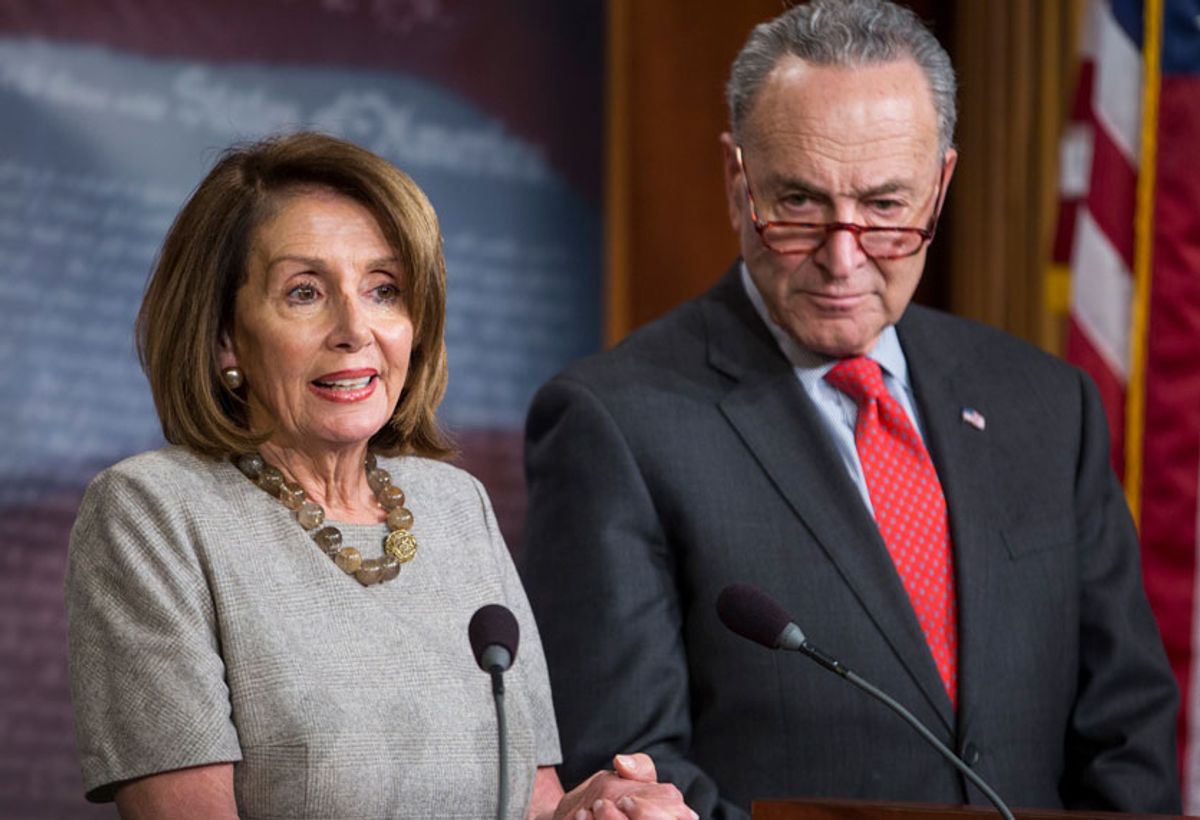House Speaker Nancy Pelosi, D-Calif., and Senate Minority Leader Chuck Schumer, D-N.Y., on Friday blasted President Donald Trump over his decision to declare a national emergency at the U.S.-Mexico, adding that they would use "every remedy available" to oppose his declaration.
In a joint statement, the top Democrats said the so-called crisis declared by Trump at the border "does not exist" and that a national emergency declaration does "great violence" to the U.S. Constitution. Pelosi and Schumer also argued that the declaration would "make America less safe, stealing from urgently needed defense funds for security and our military and our nation."
"This is plainly a power grab by a disappointed president, who has gone outside the bounds of the law to try to get what he failed to achieve in the constitutional legislative process," they said.
Trump declared a national emergency earlier on Friday during a televised event in the Rose Garden at the White House in order to access billions of dollars in funds that Congress refused to appropriate for the construction of his long-promised "wall." He is reportedly seeking to redirect funds from the Treasury Department and the Pentagon to build a wall, claiming that "some of the generals think this is more important."
"Some of the generals think this is more important . . . far more important than what they were going to use it for," Trump said. "It didn't sound too important to me."
Trump's Friday announcement follows the passage of a 1,169-page bipartisan spending package that includes $1.375 billion for 55 miles of new border fences — a snippet of the $5.7 billion Trump has sought for more than 200 miles of steel walls along the southwestern border. On Thursday, the White House announced that Trump would declare a national emergency at the border. The decision came after the commander-in-chief said he was not pleased with a bipartisan agreement reached by Congress earlier this week to avert a second government shutdown over border security and immigration.
"I am going to be signing a national emergency," Trump said on Friday. He added that declaring a national emergency is "a great thing to do" because the U.S., he claimed, has "an invasion of drugs, invasion of gangs, invasion of people," which he characterized as a grave threat to national security. The president alleged the "tremendous amounts of drugs flowing into our country" are "coming from the southern border."
Pelosi and Schumer said Trump's declaration is unlawful. They said it would "shred the Constitution" by encroaching on Congress' power to control spending. The Democratic leaders vowed to take action "in the Congress, in the Courts and in the public" to block Trump's national emergency declaration.
Trump noted that he was already expecting a legal challenge during his Friday press conference.
"So the order is signed — and I'll sign the final papers as soon as I get into the Oval Office, and we will have a national emergency," Trump said. After he signs the national emergency, Trump said, "We will then be sued," mentioning a possible chain of events, which included a "bad ruling" in the Ninth Circuit Court of Appeals, which Trump and other Republicans have contended is liberal-leaning.
"We will possibly get another bad ruling, and then we'll get another bad ruling, and then we'll end up in the Supreme Court," Trump said, comparing the process to challenges to his administration's travel ban. "And then, hopefully, we'll get a fair shake."
Many of Trump's allies, and about a half-dozen Senate Republican spoke out against the president's plan to declare a national emergency at the nation's southwestern border. Sen. Marco Rubio of Florida called it a violation of the U.S. Constitution, while Sen. Susan Collins of Maine called the decision "a mistake." Sen. Thom Tillis of North Carolina said he hates the idea of Trump declaring a national emergency at the border, and Sen. John Cornyn, who represents Texas, said "it would not be a practical resolution." Meanwhile, Sen. Lindsey Graham warned that there could be a "war" among Republicans should Trump invoke the National Emergencies Act.
White House officials, including Jared Kushner, have indicated they would prefer Trump not to rely on such an option to build the wall because of the legal challenges that would follow.
Democrats can file lawsuits and try to build bipartisan support to pass legislation to block Trump's money transfers. Under the National Emergencies Act, which Trump invoked on Friday, Congress can take up a joint resolution disapproving the national emergency — a scenario that would easily pass the Democratic-controlled House of Representatives but could face opposition in the Republican-controlled Senate. If both chambers pass the joint resolution, it would require the the president's signature. Trump is unlikely to sign a bill that overturns his own declaration.
Congress would then have to pass the joint resolution with a veto-proof majority. This means that two-thirds of the House and the Senate would have to approve the bill.
Pelosi and Schumer urged their Republican colleagues to "defend the Constitution" and fight against the declaration.
"Just as both parties honored our oath to protect the American people by passing the conference committee bill, the Congress on a bipartisan basis must honor the Constitution by defending our system of checks and balances," they said. "The president is not above the law. The Congress cannot let the president shred the Constitution."



Shares